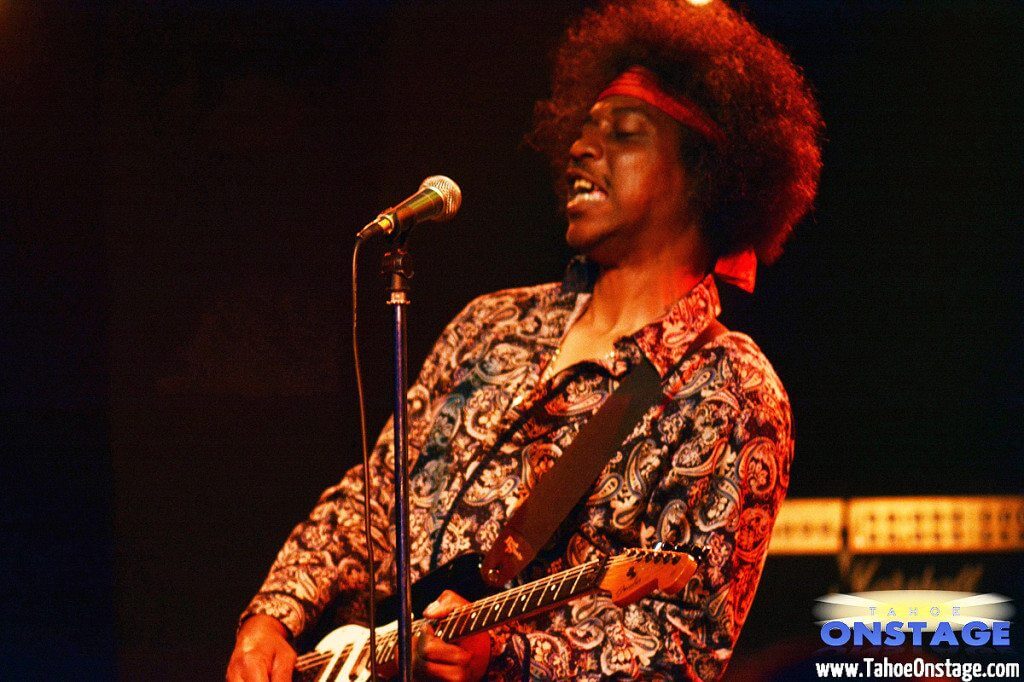
Forty-three years after his death, Jimi Hendrix remains popular.
Veteran Bay Area guitarist celebrates the music of Hendrix with his tribute band, Purple Haze. The band has developed a following at Lake Tahoe, and it plays two to three times a year in the Crystal Bay Casino Crown Room.
Purple Haze plays free in the Crown Room on Saturday, Sept. 21. The show starts at 10 p.m.
To see an interview and concert footage from a recent show at Crystal Bay, check out this video: TAHOEONSTAGE
We spoke this week with Woodson about Hendrix. Here are excerpts from the interview.
Tahoe Onstage: Jimi Hendrix died Sept. 18, 1970, so if alive he’d be 70. What do you think he would be doing now?
Ralph Woodson: I think he would be doing a lot of fusion. And I think he would be doing a lot of other things. I think he would be playing around with the rap groups and with all the different new effects that are coming out. He was always on the cutting edge equipment. Whatever new sound he liked, he would take it and manipulate it. By now, he would have created some sounds.
Tahoe Onstage: What is the easiest Hendrix song to cover?
Woodson: “Hey Joe” or “Purple Haze.” “Hey Joe” would be easier. You could just play the basic chords. You could even play open chords. “Hey Joe” is five chords.
Tahoe Onstage: How did he tune his instrument.
Woodson: Usually he tuned down to E flat, a half-step below normal tuning and sometimes almost a whole step down. They didn’t have tuners back then, so it wouldn’t always be exact. Sometimes he might be closer to D than E flat. I think he just went according to his vocal. There are a few people who don’t have to think about that. They just have incredible range but most of us have to find our key that our voice can project the best.
Tahoe Onstage: What’s the hardest song to cover?
Woodson: “Machine Gun,” “Hear My Train a Comin,’ “Red House,” the long version, copying all the parts with a 15 minute solo. Not just remembering it, but playing it with the right feel. You got to put the right stink on it.
Tahoe Onstage: A lot of great guitarists flaunt their musicianship to the point of showing off. Did Hendrix show off?
Woodson: Hendrix was a showoff in the sense that he was taking it to the next level, even with his showmanship. And then he got to a point where I came in, at Band of Gypsys. Promoter Bill Graham told him he was too good to be doing tricks all the time. Then he just stood and played, and that’s what happened that night, “Machine Gun” and all that stuff happened. So he was right. But he did what he had to do to become Jimi Hendrix. That all helped him break through. Then he got to that point where he could just stand there and play, and it was way more than enough.
Tahoe Onstage: He became Jimi Hendrix?
Woodson: He was only Jimi Hendrix for five years. He didn’t have time to get it together. He went over to London, England and became Jimi Hendrix and five years later he was dead. Before that he was Jimmy James and the Blue Flames.
Tahoe Onstage: That’s funny because his birth name was spelled Hendrix with an “x.” He already had a rock star name.
Woodson: And his middle name was Marshall. He made Marshall amp a fortune.
Tahoe Onstage: Why won’t you go on the record with your favorite Hendrix album?
Woodson: Because it changes. It depends on what I am digging at the time.
Tahoe Onstage: Who is the second greatest guitarist ever?
Woodson: There’s a million of them. Uh, Albert King and who else … The bend and stuff that Albert was doing, a lot that Hendrix got from Albert. Albert was the only one who did a lot of that stuff. He had to have been an influence. I know that Muddy Waters was in there, but Muddy Waters didn’t do a lot of those bends and stuff. Buddy Guy, you can hear some of that in his playing.
